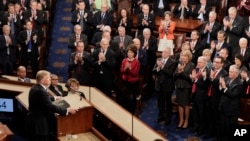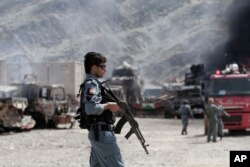President Donald Trump's speech to Congress hit home for Hewad Hemat, a former interpreter who lived with the threat of terrorism every day while helping U.S. and U.N. forces in his native Afghanistan.
Hemat attended the address Tuesday night as the guest of Senator Richard Blumenthal, a Democrat from the northeastern state of Connecticut. A vocal opponent of the Taliban and Islamic State, Hemat was encouraged by Trump's vow to pursue the extremist groups that have claimed responsibility for numerous terror attacks around the world.
"What I found interesting was that President Trump said he will intensify the fight against Islamic State," Hemat said during a visit to Voice of America's headquarters Wednesday. "They're killing Afghan troops, U.S. troops, women, children — they're killing everyone.
"Those who are fighting are not following Islam. They're not real Muslims. They're abusing Islam, misinterpreting it. It's politics, not Islam."
While Trump did not specifically mention Afghanistan, it was on the minds of many in the audience. Hemat had dinner with several senators, who thanked him for his assistance to the U.S. military, the American Embassy and the United Nations.
"We talked a lot about Afghanistan and the security situation there," he said. "I was really excited, happy, honored to be there."
Alleged terror supporters
If given a chance to talk with Trump, Hemat said he would tell the president to try to reduce outside support for the Taliban, Islamic State and allied groups.
"I would tell him that the Afghan people are victims of the same terrorists who did 9/11," Hemat said. "Put pressure on the countries — Pakistan, Iran, Russia — that are huge supporters of the Taliban and other groups, providing them with training, safe havens, money and medical facilities and directing them.
"Without that support, the Taliban is nothing; they would lose in a month."
Pakistan has denied supporting the Taliban and blames Afghanistan for not going after extremist groups that have claimed responsibility for a rash of cross-border attacks that have killed more than 150 people. It closed the border with Afghanistan two weeks ago.
Russia has claimed its contact with the Taliban is only aimed at persuading the group to take a positive role in efforts to foster peace in Afghanistan. Iran also has denied supporting terrorist groups.
Peaceful disagreement
Hewat, now a security officer with the University of New Haven's Orange campus, was also glad that Trump didn't mention the executive order — now on legal hold — banning travel to the U.S. from seven predominantly Muslim countries. Instead, the president talked of establishing a merit-based system for visas similar to those that other countries have established.
"I like what I heard," Hemat said. "He said he will try to unify the nation. We are growing."
Hemat was even cheered to witness the stark contrast between Republicans giving Trump's speech numerous standing ovations while Democrats carried out a silent, seated protest.
"This is the best part of democracy, that people can peacefully differ," he said. "Back in Third World countries, people are killing each other when they disagree."
Hemat was in college during the 9/11 attacks and the U.S. invasion of Afghanistan. He came to the United States two-and-a-half years ago and still shares a sense of disbelief that his new home has been so welcoming.
"I'm still not used to not fearing someone will kill me," he said with a smile.





